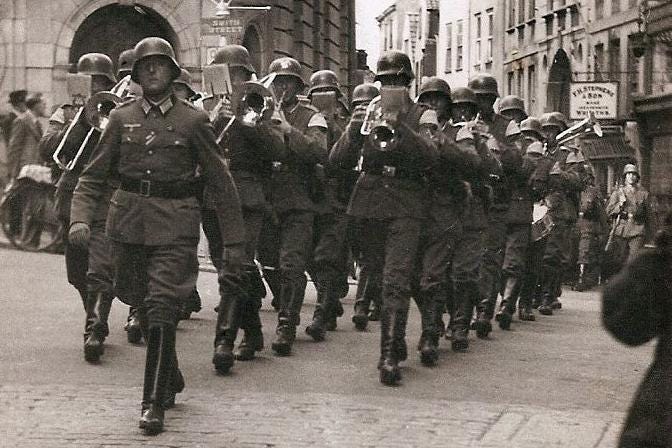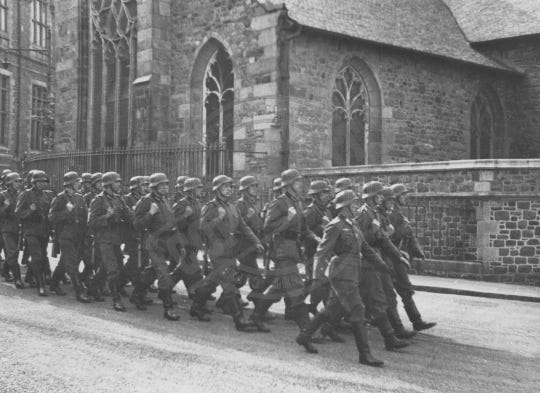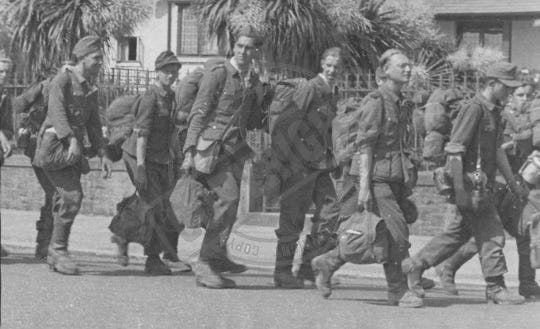Rations, Registers and Residents
Episode 3 of the Occupation story
Once the boats from England stopped, rationing bit hard. Meat could only be home grown and there was very little of it, as cattle were mostly reared for milk and cream in Jersey, and by the time the animals were slaughtered they were old and stringy. Anyway, the Germans commandeered most of what there was for their troops. At the start of the occupation the ration was three-quarters of a pound of meat a week, but it very soon began to fluctuate, and housewives – who in the main were the ones to manage rationing and produce the meals – couldn’t rely on the same amount (or any towards the end), in the ration each week.
Because of the food shortages, islanders developed everyday foods from unusual ingredients: sea water was evaporated to produce salt; tea could be made from a variety of natural items - carrots, parsley, nettles, pea pods, and coffee was made from acorns or dried, roasted parsnips and sugarbeet. In general there were more of the common vegetables available; potatoes were put through a mincer and dried to make flour, which then made cakes or pastry - of a sort.
Farmers developed some ingenious strategies for ensuring their families had meat for festivals – Christmas, Easter, weddings, etc. All pigs and cattle (I don’t think there were sheep on Jersey then, although there are a few now) had to be registered with the Germans. If a piglet or calf died or was still-born, the authorities would have to be informed. Having registered the death the farmer would pass on the corpse to a neighbour so that he could register it and so on until quite a few farmers had registered the death of one of their perfectly healthy animals. That way they all had a surplus to the register that they could slaughter in secret and pass round the family to be enjoyed at Christmas or whenever. I’d like to think the practice was never discovered.
My family was fortunate because my grandparents had come from farming families in the country, and so were donated vegetables and occasionally meat by their siblings. Papa’s sister, Auntie Flo, had taken her daughters to England in the evacuation just before the Occupation, so at weekends my aunts used to cycle up to the parish in which they lived, St Peter, to their now empty house, and work their large garden to grow extra vegetables for Granny to turn into miraculous meals.
While they were working there one day in 1941, an army truck rolled up with an officer and several soldiers all carrying kitbags. They were taking over the house to billet the soldiers. My aunts were forbidden to go there again and were told that all the vegetables they had planted were now the property of the German army. Auntie Doreen and the district nurse, whom she chaperoned after curfew, sometimes went and raided the garden if they had a visit in that parish late at night, bringing back potatoes, carrots, cabbages, anything that was ready. They were never caught.


By then there were 15,000 troops on the island, and they all had to be billeted somewhere. The Germans knocked on doors to discover who had empty rooms, and foisted the young men on families, who in the main, had no head of household as the men were away fighting the war. Mothers were finding it hard to manage on the rations and having little or no money, so when the young conscripts wanted to make friends with the family, especially the children, it was difficult to keep them at arm’s length. They would offer to pay for their washing to be done and bring into the home treats that were unobtainable to the islanders. While conscience and loyalty told residents to have nothing to do with the Occupying force, the practicalities of war said something else. Most had no choice, struggling as they were to feed their children, so took on the washing and fed the soldiers. A soldier’s rations, at the start of the Occupation, were better than the resident population’s, which would have been a help to the woman having to cater for him. However by 1944, it didn’t matter what the formal rations were, everyone was starving, Germans as much as everyone else.
Orders came and went for the keeping of wirelesses. The public were warned in 1940 that the retention of wireless sets was ‘dependent on good behaviour and a loyal attitude’. A loyal attitude to the German authorities of course. As the war progressed and began to go against Germany, the authorities didn’t want anyone listening to the BBC and so confiscated all wirelesses, with heavy penalties for those caught with them. Even though the British government had handed the islands over to the Germans, the Occupying forces were constantly worried that an attempt would be made to free them and that the residents would get instructions from BBC broadcasts on what their roles would be in assisting the freedom.
Many people, including my grandfather, built ‘cat’s whisker’ sets and hid them, in Papa’s case, in the attic stairs. He listened every night to the BBC news and my granny and aunts never knew exactly where or which stair it was behind. Auntie Kay said that was mainly to protect the stash of bootleg whisky he was also hiding behind the stair.
At the start of 1941, the Germans announced that postal services between the Channel Islands and Occupied France, and also to Germany, Belgium and Italy were to be restored. This seems to have triggered an unique event – the design of Jersey’s first postage stamp – 1d value.
The authorities had to sanction the design, and they failed to notice that it incorporated four small ‘A’s in the corners which stood for ‘Ad Avernam, Adolphé Atrox’ which meant ‘To hell with you, atrocious Adolf’. Later, the halfpenny stamp had ‘A’ ‘A’ and ‘B’ ‘B’ in its corners which stood for ‘Atrocious Adolf’ and ‘Bloody Benito’. Word soon got around stamp collectors and they remain a novelty today.
The tea ration shrank as did other rations, depending as they did on freight arrivals from France or Germany. By mid 1941 tea was down to 2 ounces a week, per person. My mum, who arrived in Jersey from England in 1946, after marrying my dad during the war, told the tale of being offered a cup of tea by my gran and a large teapot emerging from the oven, which apparently was made in the morning and topped up and kept warm all day. The habit didn’t change after the occupation because they were still under rationing until the early 1950s. Needless to say my mum was horrified and the tea tasted disgusting, but then she had never had to do without in England.
Next time I’ll tell you about the TODT workers, the slaves brought over to build roads, fortifications and tunnels, and who were abysmally treated by the Germans, and also about the internments that took place in 1942. I’m aware that the more I write, the less I’m covering. So much happened in those years and I can only give you a flavour and then mostly how it affected my family. Thanks for reading or listening. I’m glad to see you here each month.
§§§§§§§§§§§§§§§§§§§§§
I’ve read
Western Lane Chetna Maroo. Long listed for the Booker, this is a meditation on family, grief-processing and loss. I’t also about squash and first love. It’s short as seems to be the fashion today, but encapsulates the life of Gopi, who at eleven, embodies the family’s hopes for success on the squash court. I found the extended family’s attitude, especially the auntie’s, bewildering and even upsetting. I didn’t understand the cultural reasons for the aunt forbidding Gopi’s ambitions and I was jumping up and down shouting at the book. Beautifully written, it might be a Marmite book but I loved it and Gopi.
I’ve listened to
The Girls of Slender Means Muriel Spark R4 and BBC Sounds. The novel adapted as a play for radio and worked very well. Set in 1945, three young women (of slender means), live in London on the top floor of the May of Tek Club in a sort of hostel. The play captures the immediate post-war headiness, rationing and gentile poverty. The dialogue was light and brittle, and developed the hopes, ambitions and almost spitefulness of these very different young women.





Helen, thanks for your comments, there’s lots more to come on the Occupation. I’ve done little more than scratch the surface so far. I will just correct a misconception about who could be evacuated. Anybody could. You didn’t have to be married to an English person. My great aunt Florence (Flo) went with her daughters. They were all jersey born but they didn’t come back after war so we only saw her occasionally when she paid a visit from Bournemouth. She was a very large scary woman to us kids but my aunts thought she was lovely because she wasn’t as strict as their father, my grandfather.
These posts are so interesting, Sue. The ingenuity of your family and other islanders ... having the conscripts to stay ... the reality of it really comes across. So moving.